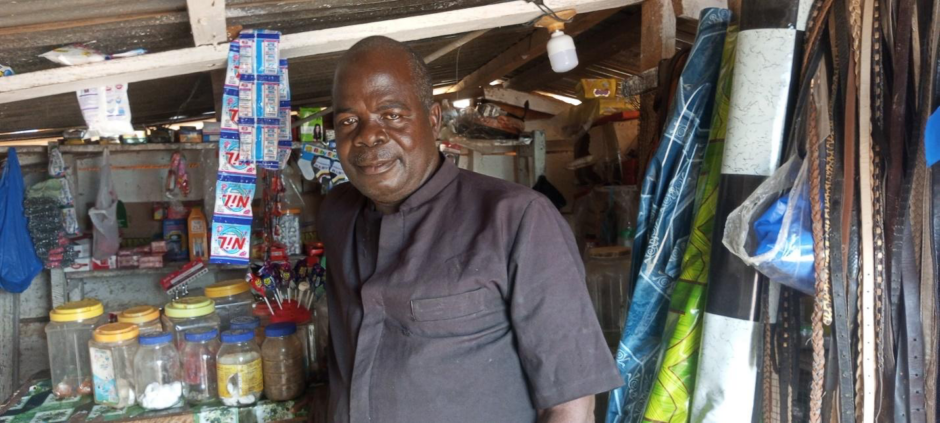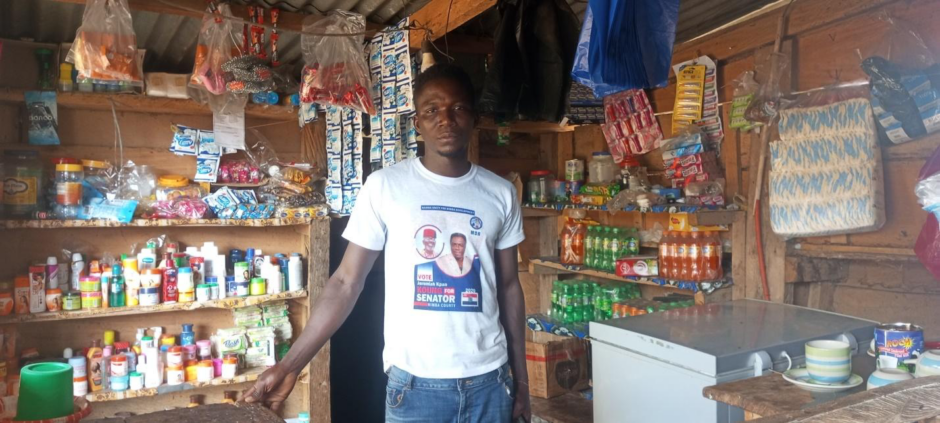
Samuel G. Youhn, 62, has lived almost his entire life without electricity. His native Nimba County, like every part of Liberia, felt the pinch of the country’s brutal civil wars that destroyed electricity and other infrastructure, in addition to the estimated 250,000 lives they claimed.
So, when Youhn heard that Jungle Energy Power, Inc. (JEP), a Liberian owned electricity company, was supplying power to rural communities, he hurriedly subscribed, paying $US110 for a meter. Youhn said it was a wise economic decision, as the subscription has reduced his expenditure on electricity. He spends $LD1000 (about $US5) daily on gasoline to power the 2.5KVA generator that powers his shop, so it quickly adds up to more than the meter.
“For the generator, most of the time you don’t use it at night,” said Youhn. “But for JEP, we use the light for 24 hours and we are really enjoying the light.”

Access to electricity remains a major problem for Liberia, with “about a quarter of the country’s population having access to some sources of electricity and only about 7% having access to grid electricity,” according to a 2020 World Bank report.
Liberia is still struggling to upgrade its electricity supply capacity due to frequent power outages from the Mount Coffee Hydro Plant, its national grid, and the much-heralded Transmission Company Côte d’Ivoire, Liberia, Sierra Leone, and Guinée (TRANSCO CLSG), a project funded by the World Bank, and other international donors.
For the over 11,000 residents in Nimba and Bong Counties who are customers of JEP, the company has given them hope for a better future, they said, as they extend their daily hustles to the night hours in a secure environment, free from harassment and intimidation that they used to face when they didn’t have light.
“We can even close [business] late, and we are making more money now than before the coming of JEP,” said Youhn. “At the time, [when] current was not here, buyers would go to bed soon, and we too would be forced to go to bed. We praise the management of JEP for giving us electricity.”
Abel Siahto, 26, operates a video club here in Gbeh Duoplay Town with electric power from JEP. Siahto said he was spending more than $LD45,000 ($US240) in monthly fuel for a generator before he joined JEP. He said his costs were reduced to $US10.00 per month when he switched to JEP.
“Before, each night we used to burn one to one and a half gallons of gasoline,” said Siahto.
“If we were paying for gasoline now, as things are tough, it would not be easy for this business.”
28-year-old Levi Yormie, another local shop operator, echoed Yough’s and Siahto’s sentiments about the reliability of JEP’s electricity.
“Before, I only used to sell during the day,” said Yormie. “Now, the current is improving and helping me to sell during days and nights, because we charge our phones, and sell under the current, so it helps us improve our businesses.”

Owned and operated by Tomah Seh Floyd, Sr., JEP was established in 2017. In 2021 it was licensed to operate by the Liberia Electricity Regulatory Commission (LERC). JEP operates a 25-year contract with the Liberia Electricity Corporation (LEC) to supply electricity to rural communities, including those along the Liberian—Guinean border.
It’s part of a “Power Purchase Agreement (PPA),” between the LEC and the Ivory Coast Electricity Company (CIE), which provides 41 megawatts of electricity to JEP. JEP sells the electricity, with the profits split between itself, LEC, and CIE.
“As part of our responsibility, we are supposed to provide electricity to every household,” said Tomah. “We are committed to doing this.”

Tomah’s company is the only privately-owned Liberian company supplying electricity to rural communities. But as much as it has been a big help to the community here there are problems. Many customers accused JEP’s field agents of corruption.
“The agents can be asking us to give their car pay,” said Siahto. “They can be telling us to give them gas. The company gave motorbikes and gasoline to the agents, then while they are telling us to pay for gas or car pay?”
Tomah said although he hasn’t officially received complaints from customers about the alleged issue, it’s unacceptable and forbidden and he called on customers to alert him.
“If you have a staff member charging you any amount before performing his duty, we will definitely frown on that employee,” said Tomah. “Because this is a no-go zone for them. We always emphasize it in our meetings.”
But corruption is something that has long dogged the government electricity agency. The LEC has investigated and dismissed employees involved in power theft or extortion of money from customers in exchange for services.
Experts say stable and reliable electricity is critical to giving companies the power they need to build strong businesses that employ more Liberians. With every presidential candidate in October’s election promising to resuscitate Liberia’s ailing economy, energy experts say how they deliver a stable and cheaper electricity will be key to helping them fulfil their pledge of a revitalized economy.
This story was a collaboration with New Narratives as part of the “Investigating Liberia” project. Funding was provided by the Swedish Embassy in Monrovia. The funder had no say in the story’s content.
